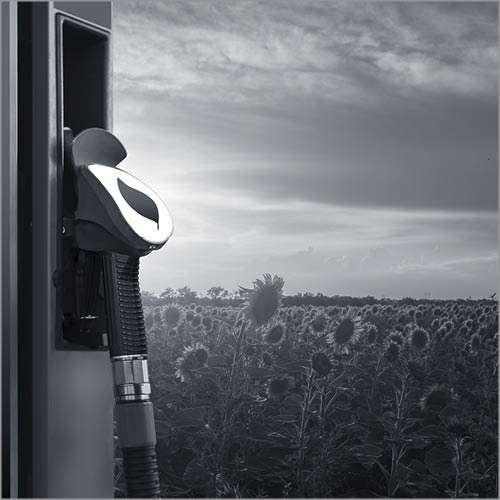In the Hydroprocessed Esters and Fatty Acids (HEFA) biofuel production process, the hydrodeoxygentation (HDO) unit is crucial for converting the feedstock, typically consisting of vegetable oils or animal fats, into renewable diesel or jet fuel. The HDO unit relies on a catalyst to remove oxygen atoms from the feedstock molecules, resulting in the production of hydrocarbons with superior fuel properties.
Contamination in the bio-feedstock, in the form of particulates, impurities, and undesired chemicals, can have detrimental impact on the HDO catalyst. Firstly, these contaminants can cause catalyst fouling, leading to reduced activity and selectivity. Fouling occurs when the contaminants accumulate on the catalyst surface, obstructing active sites and impeding the catalytic reaction. Reduced catalyst activity results in lower conversion rates, decreased fuel yield, and increased energy consumption.
Furthermore, contamination can impact the stability and lifespan of the catalyst. Undesirable chemicals present in the bio-feedstock may accelerate catalyst deactivation and sintering, a process where catalyst particles fuse together and lose their surface area, diminishing their efficiency. This can lead to a decline in the catalyst's overall performance, necessitating more frequent catalyst replacement, and consequently increasing maintenance costs and downtime for the HDO unit.
Protecting the HDO catalyst against contamination
In this case study, we will examine how Pall’s solution enhanced the protection of a European renewable fuel refinery's HDO catalyst from harmful contaminants found in the bio-feedstock.
The refinery faced a significant challenge in maintaining the catalyst's performance due to the presence of contaminants which eventually led to the premature replacement of the catalyst. This caused the refinery to lose two (2) weeks of production to complete catalyst replacement at an increased catalyst price due to the sooner than expected replacement.
The Challenge
The bio-feedstock, contained a substantial amount of contaminants, in some cases having TSM (Total Suspended Material) values as high as 1300mg/L.
Moreover, the contaminants primarily consisted of "soft" particles, seen in the large difference in concentration between the TSM and the TSS (Total Suspeneded Solids) values. This posed a significant filtration challenge as soft particles stick to the outer layer for filter media greatly reducing filter performance. As a result, the refinery experienced frequent filter element replacements, and excessive filter consumption.
Sample Feedstock | TSM (mg/L) | TSS (mg/L) |
|---|---|---|
UCO1 Source #1 | 1300 | 25 |
UCO Source #2 | 1100 | 15 |
SBEO2 | 1100 | 10 |
Tallow | 1250 | 45 |
Blend 1 (25% each) | 1000 | 25 |
Table 1: Feedstock contamination profile
1 UCO = Used Cooking Oil, 2 SBEO = spent bleaching earth oil
These conditions also presented a serious risk to the performance of the HDO catalyst, potentially leading to catalyst fouling, decreased conversion rates, and increased maintenance costs. To address these issues, the refinery required a robust filtration solution that could effectively eliminate the contaminants from the bio-feedstock while minimizing any negative impact on the catalyst's activity and selectivity.
The Solution
To address this challenge, the European refinery collaborated with Pall engineers to firstly assess the level and type of contamination to determine the most suitable contamination control solution.
Pall recommended a two-stage filtration system. The first stage, a 50µm rated pre-filter followed by a 10µm rated filter, to effectively remove contaminants from the bio-feedstock before it reached the HDO catalyst.
Both stages utilized Pall's high-efficiency pleated depth filter media Vector™, specifically designed to capture and retain the problematic "soft" particles present in the bio-feedstocks. These pleated filters offered superior dirt-holding capacity and a long service life, enabling extended operation between filter replacements and reducing downtime.
The Results
The refinery experienced a twofold increase in the lifespan of filter elements, resulting in a 50% reduction in disposed elements and ensuring the reactor completed the entire campaign without any contamination-related stoppages.
Solution Benefits
The Pall filtration solution brought several significant benefits to the European renewable fuel refinery:
- Enhanced Catalyst Protection: Effective removal of contaminants from the bio-feedstock, meeting the required 10µm standard. This robust protection minimized the risk of fouling and preserved the designed length performance of the HDO catalyst.
- Improved Product Quality: The filtration system ensured a higher level of purity in the biofuel produced and enhanced the overall market value of the refinery's products.
- Increased Operational Efficiency: Reduced catalyst fouling allowed for longer operational cycles and fewer maintenance shutdowns, resulting in improved refinery throughput and reduced operational costs.
- Extended Reactor Campaign Length: Potential to reduce the volume of guard bed / inactive catalyst within the reactor. This, in turn, promoted extended campaign run lengths and increased efficiency.
Contact us on the form provided to discover how we can support you with your specific challenges.
Ready to discover how our solutions can work for your needs? Contact us to speak to our expert filtration team.





